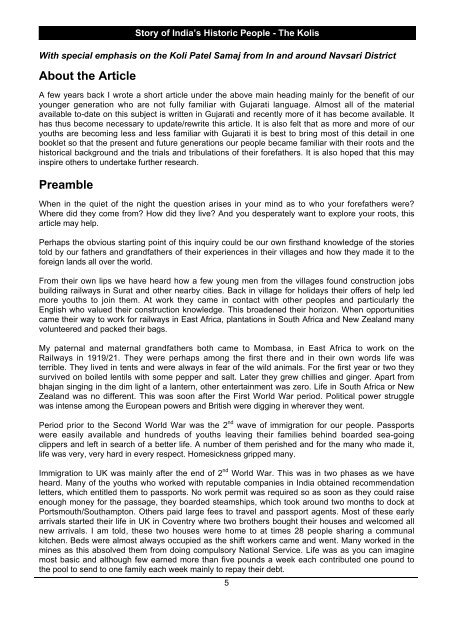THE ASSOCIATION OF MANDHATA SAMAJ UK - Mandhata Global
THE ASSOCIATION OF MANDHATA SAMAJ UK - Mandhata Global
THE ASSOCIATION OF MANDHATA SAMAJ UK - Mandhata Global
Create successful ePaper yourself
Turn your PDF publications into a flip-book with our unique Google optimized e-Paper software.
Story of India’s Historic People - The Kolis<br />
With special emphasis on the Koli Patel Samaj from In and around Navsari District<br />
About the Article<br />
A few years back I wrote a short article under the above main heading mainly for the benefit of our<br />
younger generation who are not fully familiar with Gujarati language. Almost all of the material<br />
available to-date on this subject is written in Gujarati and recently more of it has become available. It<br />
has thus become necessary to update/rewrite this article. It is also felt that as more and more of our<br />
youths are becoming less and less familiar with Gujarati it is best to bring most of this detail in one<br />
booklet so that the present and future generations our people became familiar with their roots and the<br />
historical background and the trials and tribulations of their forefathers. It is also hoped that this may<br />
inspire others to undertake further research.<br />
Preamble<br />
When in the quiet of the night the question arises in your mind as to who your forefathers were?<br />
Where did they come from? How did they live? And you desperately want to explore your roots, this<br />
article may help.<br />
Perhaps the obvious starting point of this inquiry could be our own firsthand knowledge of the stories<br />
told by our fathers and grandfathers of their experiences in their villages and how they made it to the<br />
foreign lands all over the world.<br />
From their own lips we have heard how a few young men from the villages found construction jobs<br />
building railways in Surat and other nearby cities. Back in village for holidays their offers of help led<br />
more youths to join them. At work they came in contact with other peoples and particularly the<br />
English who valued their construction knowledge. This broadened their horizon. When opportunities<br />
came their way to work for railways in East Africa, plantations in South Africa and New Zealand many<br />
volunteered and packed their bags.<br />
My paternal and maternal grandfathers both came to Mombasa, in East Africa to work on the<br />
Railways in 1919/21. They were perhaps among the first there and in their own words life was<br />
terrible. They lived in tents and were always in fear of the wild animals. For the first year or two they<br />
survived on boiled lentils with some pepper and salt. Later they grew chillies and ginger. Apart from<br />
bhajan singing in the dim light of a lantern, other entertainment was zero. Life in South Africa or New<br />
Zealand was no different. This was soon after the First World War period. Political power struggle<br />
was intense among the European powers and British were digging in wherever they went.<br />
Period prior to the Second World War was the 2 nd wave of immigration for our people. Passports<br />
were easily available and hundreds of youths leaving their families behind boarded sea-going<br />
clippers and left in search of a better life. A number of them perished and for the many who made it,<br />
life was very, very hard in every respect. Homesickness gripped many.<br />
Immigration to <strong>UK</strong> was mainly after the end of 2 nd World War. This was in two phases as we have<br />
heard. Many of the youths who worked with reputable companies in India obtained recommendation<br />
letters, which entitled them to passports. No work permit was required so as soon as they could raise<br />
enough money for the passage, they boarded steamships, which took around two months to dock at<br />
Portsmouth/Southampton. Others paid large fees to travel and passport agents. Most of these early<br />
arrivals started their life in <strong>UK</strong> in Coventry where two brothers bought their houses and welcomed all<br />
new arrivals. I am told, these two houses were home to at times 28 people sharing a communal<br />
kitchen. Beds were almost always occupied as the shift workers came and went. Many worked in the<br />
mines as this absolved them from doing compulsory National Service. Life was as you can imagine<br />
most basic and although few earned more than five pounds a week each contributed one pound to<br />
the pool to send to one family each week mainly to repay their debt.<br />
5

















